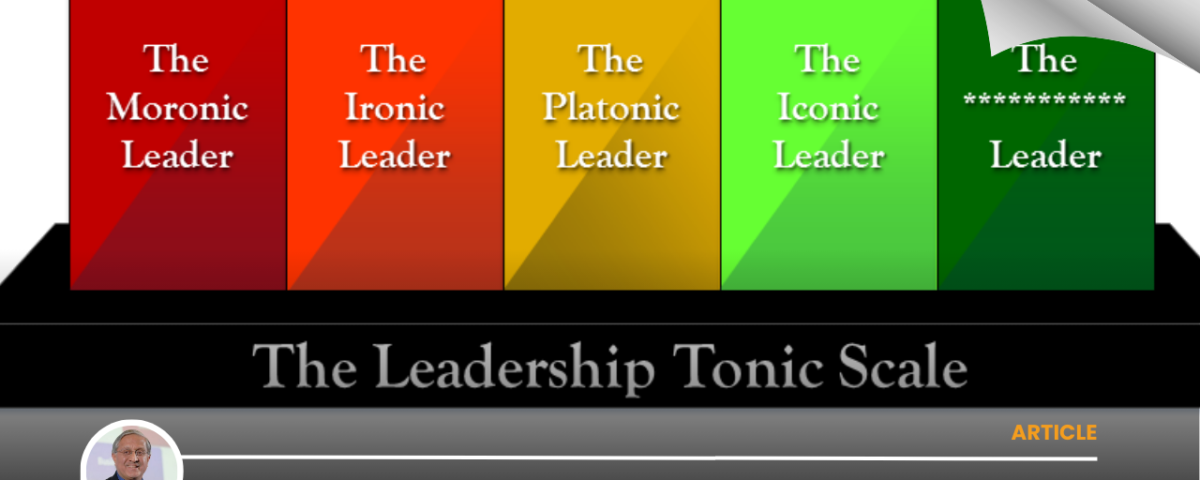10th April 2020 THE WISE LEADER
To win in life, you don’t require ambition for its own sake. Leaders need to think of humility as being in the service of ambition.
R. Gopalakrishnan*
(*The author is a corporate advisor and Distinguished Professor of IIT Kharagpur. During his career, he was Director of Tata Sons and Vice Chairman of Hindustan Unilever)
Email: rgopal@themindworks.
I received positive reader responses to my last column. (Beware of competence without humility or humanity, BS, 13th March). One reader posed a tricky question: why are so many leaders arrogant if it is obvious that humility is very important? I had to delve back into my readings and available research.
Ambition and humility
Ambition is about glory; humility is about burden and suffering. Do ambition and humility at all mix?
The word ‘ambition’ originated from the Latin, ambitionem, which meant canvassing; it used to have a negative connotation. Plato and Aristotle preached that ambition was no virtue, because it meant politicians who wanted glory more than its burden; in this traditional view, ambition and humility just do not mix.
Bill Taylor discussed this in HBR, 15th October 2015, mentioning the widespread impression that humble people cannot be ambitious. MIT Leadership Professor, Edgar Schein, says that this is exemplified by newly promoted managers, who responded that now “they can tell others what to do”. This reality that ‘I am now the boss’ lay at the root of the problem.
A Nike hoarding in the 1996 Atlanta Olympics asserted, “You don’t win silver, you lose gold.” If you are not winning, you are losing because life is forever competitive.
Regrettably this widely held belief is wrong. To win in life, you don’t have to be ambitious per se. Leaders need to think of humility as being in the service of ambition.
While ambition seeks overarching goals, humility acknowledges dependence on others to achieve it. If ‘conquest at any cost’ is your ambition, then unbridled arrogance and ill-treatment of the vanquished follows. Roman General Coriolanus said, ‘I do not want the job, but only the honor.’ History bears witness that leaders’ ambitions were often to conquer territories and to vanquish foes. In contrast, note what Haider Ali told son, Tipu Sultan, on his deathbed, “While we may seize a crown, the crown may escape us if we do not entrust to the love of people.”
Lessons from history
Roman emperors were bloody. Tiberius sank into morbid suspicion of everyone and his ways of power were chilling and monstrous. His successor, Caligula, developed early paranoia and, with it, highly erratic behavior. Nero was an emperor whom everybody loved to hate. And the list goes, for all of three hundred years.
Aurangzeb may well qualify as the cruelest Moghul. Despite Dr Audrey Truschke’s (Professor of South Asian history) argument that “India’s most loathed Muslim evildoer was not so heinous after all”, Aurangzeb was no humane or humble leader. The Central Asian custom was that all male family members had equal claim to political power, so family fratricide became inevitable. Aurangzeb had the head of elder brother, Dara Shukoh, carried around the streets. Aurangzeb was hugely successful in growing and expanding the empire; paradoxically, he claimed that his main pursuit was to be a fair and ethical ruler but also said, “An emperor ought to stand midway between gentleness and severity.”
On one occasion, Aurangzeb told his father that ‘skilled conquerors are not always skilled rulers.’ Now, apply this to modern times.
Lessons for managers and administrators
Among corporate titans, some leaders are so acquisition-focused that they fail to deliver the benefits of the acquisitions to their shareholders. They leave hopelessly extended and financially weakened business empires for their successors. In my book, Crash: lessons from the rise and exit of CEOs, I referred to this malaise, when I argued, controversially in hindsight, that power temporarily damages the brain of leaders. I had quoted psychology Professor Dacher Keltner, who concluded that leaders “act as if they had suffered a traumatic brain injury.” Professor Ian Robertson of Trinity College, Dublin pointed out that “when power is unconstrained by democratic controls or good systems of governance, power holders may show undesirable distortions in judgment, cognition and behavior.”
Among the ways to mitigate the bad effects of power, strong corporate governance and stalling the blatant or repeated misuse of power are key.
Arrogance is seen in public life as well. The editorial in BS on 22nd March pointed out the discourtesies of ministers when it came to their officers. Ms Nirmala Sitharaman’s outburst in Assam against SBI Chairman, Rajnish Kumar, was distasteful. So too, Sanjay Gandhi’s boorish treatment of then SBI Chairman, RK Talwar, as well as Rajiv Gandhi’s inelegant announcement about changing the Indian Foreign Secretary. As the BS editorial avers, “a bullying culture is embedded in the hierarchical underpinnings of Indian society”.



